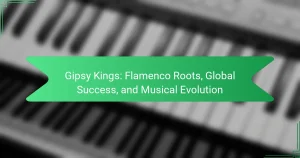Youssou N’Dour has shaped the global music landscape through his unique genre blending, impactful social activism, and enduring musical legacy. His fusion of traditional Senegalese mbalax with jazz and pop has broadened the appeal of African music. N’Dour’s commitment to human rights and social justice has inspired many artists to advocate for change. His collaborations with international musicians further enhance his influence and showcase the power of music in promoting cultural exchange.
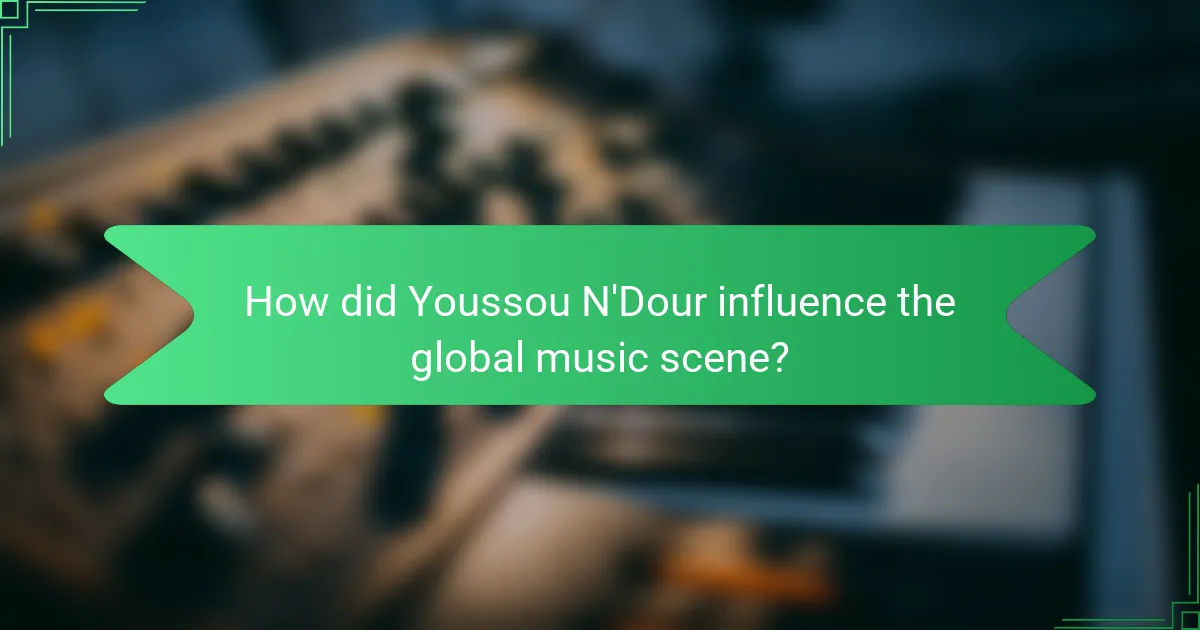
How did Youssou N’Dour influence the global music scene?
Youssou N’Dour significantly influenced the global music scene through genre blending, social activism, and his lasting musical legacy. His fusion of traditional Senegalese music with various global styles, such as jazz and pop, expanded the reach of African music. N’Dour’s activism, particularly in human rights and social justice, resonated worldwide, inspiring other artists to use their platforms for change. His collaborations with international stars like Peter Gabriel and Neneh Cherry introduced African rhythms to broader audiences, solidifying his role as a pioneer in world music.
Which genres did Youssou N’Dour blend in his music?
Youssou N’Dour blended various genres, including mbalax, pop, jazz, and reggae. His music uniquely fuses traditional Senegalese rhythms with global influences, creating a distinctive sound. This genre blending reflects his social activism and cultural heritage, making him a pivotal figure in world music. N’Dour’s ability to incorporate diverse styles has contributed to his lasting musical legacy.
What role did traditional Senegalese music play in his sound?
Traditional Senegalese music significantly shaped Youssou N’Dour’s sound by incorporating rhythms, instruments, and cultural narratives. His music blends mbalax, a traditional genre, with various styles, showcasing Senegal’s rich musical heritage. N’Dour’s use of the sabar drum highlights the unique attributes of Senegalese music, creating a vibrant, rhythmic foundation. This integration fosters social activism themes, reflecting the cultural context of his work.
How has his music evolved over the decades?
Youssou N’Dour’s music has evolved significantly over the decades, blending traditional Senegalese sounds with global influences. Initially rooted in mbalax, his style incorporated elements of jazz, reggae, and pop, showcasing his versatility. In the 1990s, he gained international acclaim, collaborating with artists like Peter Gabriel and Bruce Springsteen. His lyrics increasingly addressed social issues, reflecting his role as a social activist. More recently, N’Dour has embraced digital platforms, reaching younger audiences while maintaining his cultural heritage. This evolution highlights his unique ability to adapt while staying true to his roots.
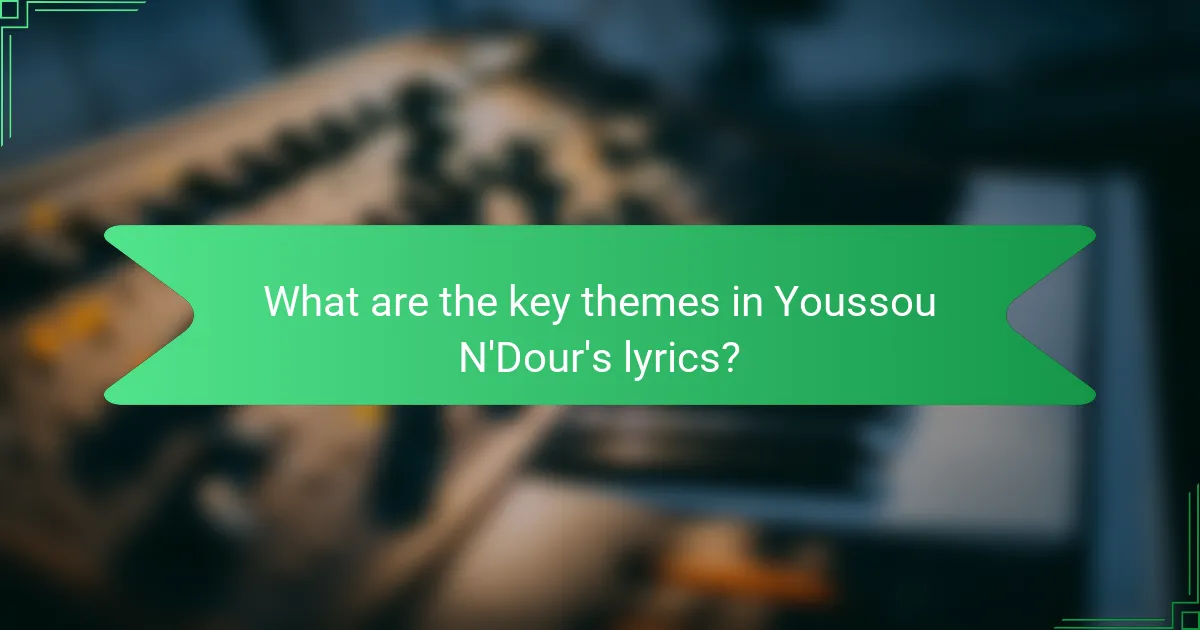
What are the key themes in Youssou N’Dour’s lyrics?
Youssou N’Dour’s lyrics emphasize genre blending, social activism, and cultural pride. His music combines traditional Senegalese sounds with global influences, creating a unique sound. N’Dour addresses social issues, advocating for peace, justice, and empowerment through his lyrics. His legacy is marked by his ability to inspire change and promote African identity, making him a significant figure in world music.
How does social activism manifest in his songs?
Youssou N’Dour’s songs manifest social activism through powerful lyrics addressing political issues, human rights, and social justice. His music often reflects Senegal’s struggles and promotes unity and change. For example, in “Wake Up,” he calls for awareness and action against injustice. N’Dour’s genre-blending style enhances his messages, making them accessible to diverse audiences. His unique ability to fuse traditional Senegalese music with global influences amplifies the impact of his activism.
Which social issues does he address through his music?
Youssou N’Dour addresses various social issues through his music, including poverty, education, and political oppression. His songs often highlight the struggles of marginalized communities in Senegal and beyond. For example, “Seven Seconds” emphasizes racial equality and unity. Additionally, he advocates for health awareness, particularly in relation to HIV/AIDS. His genre-blending style amplifies these messages, reaching diverse audiences and fostering social change.
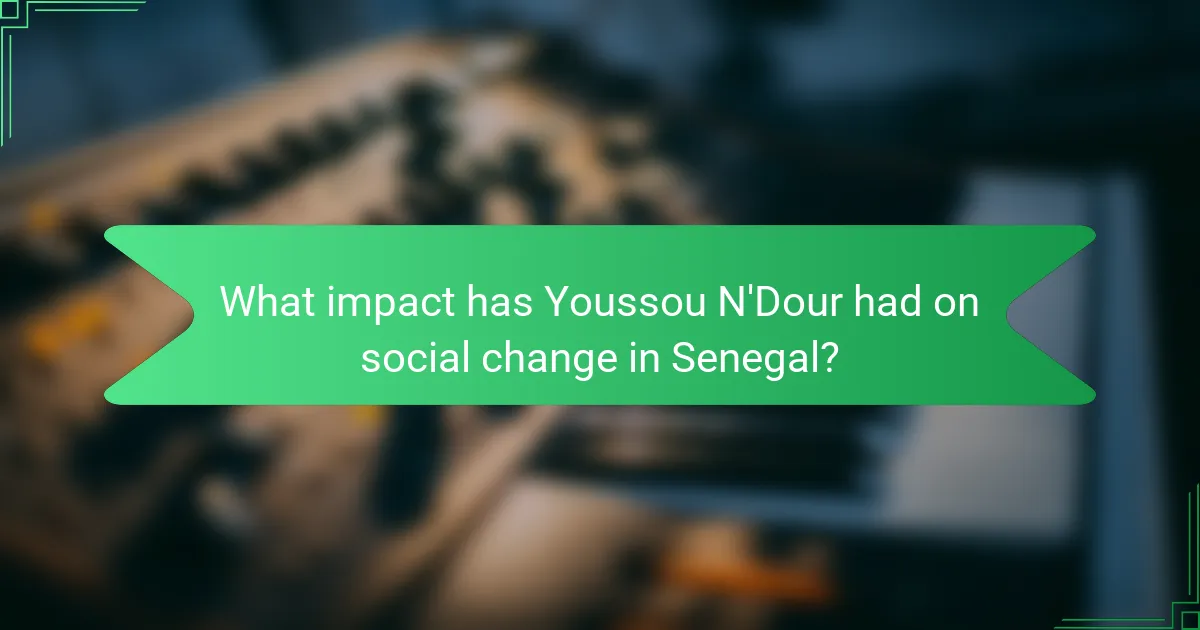
What impact has Youssou N’Dour had on social change in Senegal?
Youssou N’Dour has significantly influenced social change in Senegal through his music and activism. His genre-blending style has united diverse communities, while his advocacy for democracy and human rights has raised awareness on critical issues. N’Dour’s unique attribute as a cultural ambassador has empowered youth and inspired social movements. His concerts often serve as platforms for political dialogue, enhancing civic engagement. This impact is evident in his role during protests advocating for social justice and political reform.
Which organizations has he supported through his activism?
Youssou N’Dour has supported various organizations through his activism, focusing on social justice and humanitarian efforts. He has collaborated with UNICEF, advocating for children’s rights and education. Additionally, he has worked with organizations like the Global Fund to Fight AIDS, Tuberculosis, and Malaria, promoting health initiatives in Africa. His activism also includes efforts for environmental sustainability and cultural preservation, making significant contributions to various non-profits.
How has he mobilized communities for social justice?
Youssou N’Dour has mobilized communities for social justice through his music and activism. He uses his platform to raise awareness about social issues in Senegal and beyond. His songs often address poverty, education, and political corruption. N’Dour actively participates in campaigns and collaborates with various organizations to promote human rights. His unique ability to blend traditional Senegalese music with global genres amplifies his message and resonates with diverse audiences.
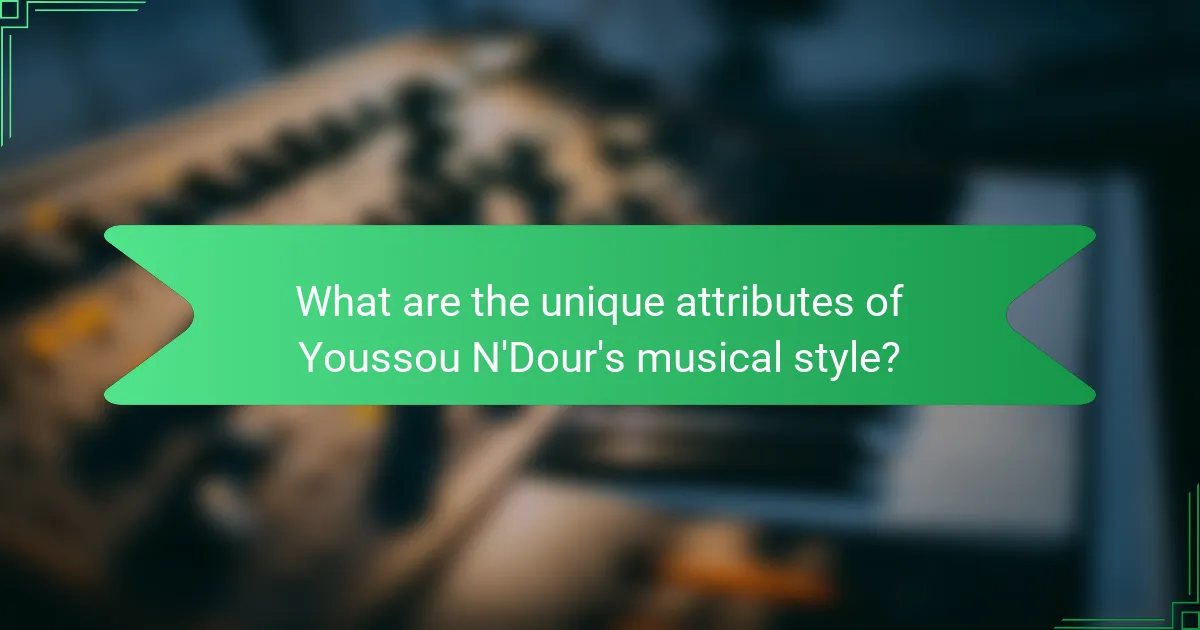
What are the unique attributes of Youssou N’Dour’s musical style?
Youssou N’Dour’s musical style uniquely blends traditional Senegalese mbalax with various global genres. His incorporation of pop, jazz, and reggae creates a distinctive sound. N’Dour’s socially conscious lyrics reflect his activism, addressing themes like poverty and injustice. His vocal range and emotive delivery further enhance his musical legacy.
What instruments are signature to his performances?
Youssou N’Dour’s performances are signature for their use of traditional African instruments, particularly the kora and djembe. These instruments enhance the fusion of various genres, including mbalax, pop, and reggae. The kora, a 21-string lute, adds melodic depth, while the djembe provides rhythmic complexity. Together, they create a unique sound that reflects N’Dour’s cultural heritage and musical innovation.
How does he incorporate other cultural influences into his work?
Youssou N’Dour incorporates various cultural influences into his work by blending traditional Senegalese music with global genres. He integrates elements of jazz, reggae, and pop, creating a unique sound that resonates internationally. His collaborations with artists from different backgrounds further enrich his music, showcasing a fusion of styles. This genre-blending approach not only broadens his appeal but also promotes cultural exchange and understanding.
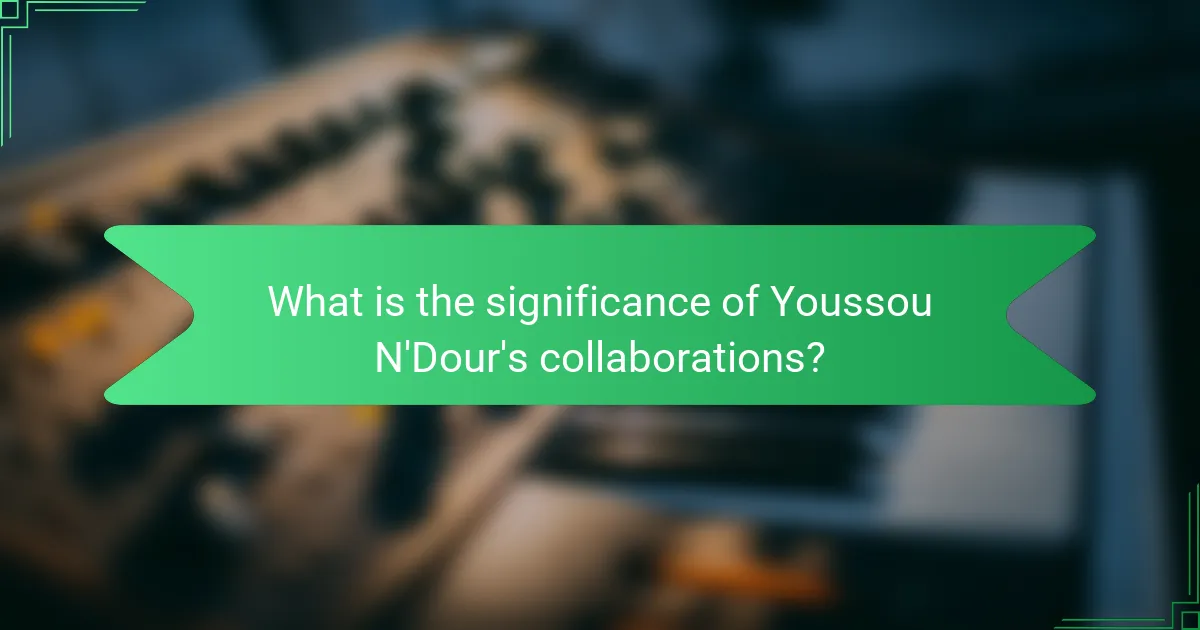
What is the significance of Youssou N’Dour’s collaborations?
Youssou N’Dour’s collaborations significantly enhance cultural exchange and social impact. His partnerships with diverse artists, including Peter Gabriel and Neneh Cherry, blend genres, creating a unique sound that transcends borders. These collaborations amplify his voice in social activism, addressing issues like poverty and human rights. N’Dour’s musical legacy is enriched through these connections, showcasing the power of unity in music.
Which notable artists has he collaborated with?
Youssou N’Dour has collaborated with several notable artists including Peter Gabriel, Neneh Cherry, and Sting. His work often blends diverse musical styles, showcasing his unique ability to connect cultures through music. This collaboration has resulted in rich, genre-defying compositions that emphasize social activism and cultural exchange.
How do these collaborations enhance his musical diversity?
Collaborations enhance Youssou N’Dour’s musical diversity by introducing new genres and cultural influences. His partnerships with various artists allow for genre blending, creating a unique sound that incorporates elements from pop, jazz, and traditional African music. This fusion not only broadens his audience but also enriches his artistic expression. For instance, his work with international musicians has led to innovative rhythms and melodies that transcend cultural boundaries. As a result, N’Dour’s music reflects a rich tapestry of global influences, showcasing his commitment to social activism through art.
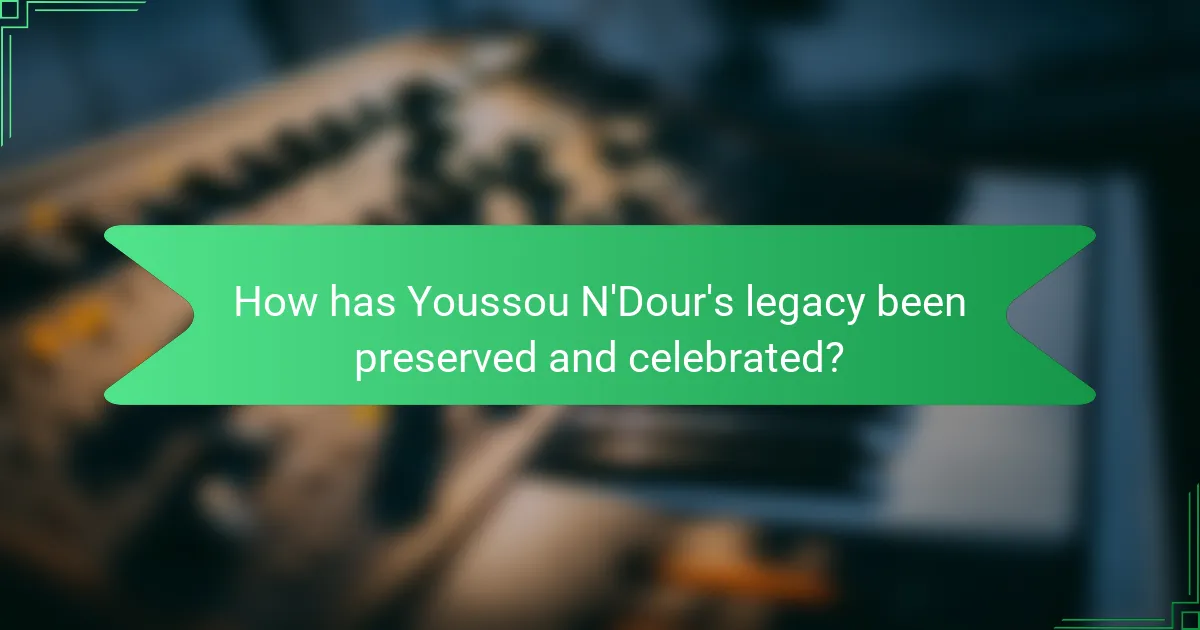
How has Youssou N’Dour’s legacy been preserved and celebrated?
Youssou N’Dour’s legacy is preserved through music, activism, and cultural recognition. His genre-blending style has influenced artists globally, merging traditional Senegalese music with various genres. Social activism is a core aspect of his legacy; he has advocated for human rights and social justice, notably during political crises in Senegal.
Recognition of his contributions includes numerous awards, such as the UNESCO International Music Prize. His music continues to be celebrated through festivals and tributes, ensuring that his impact remains vibrant in contemporary culture. Collaborations with international artists further amplify his influence, showcasing his unique ability to connect diverse musical traditions.
Which awards and recognitions has he received?
Youssou N’Dour has received numerous awards and recognitions throughout his career. His accolades include the UNESCO International Music Prize in 2004, the Kora All Africa Music Award for Best West African Artist, and a Grammy Award for Best World Music Album in 1995. He was also honored with the title of African Ambassador for Peace by the United Nations. These recognitions highlight his influence in music and social activism.
How do festivals and events honor his contributions to music?
Festivals and events honor Youssou N’Dour’s contributions to music through performances, tributes, and cultural showcases. These celebrations often feature his genre-blending style, which combines traditional African sounds with global influences. Events like the Dakar Music Festival highlight his social activism, raising awareness on issues such as poverty and education. Additionally, his musical legacy is celebrated through awards and recognitions, reinforcing his impact on the global music scene.
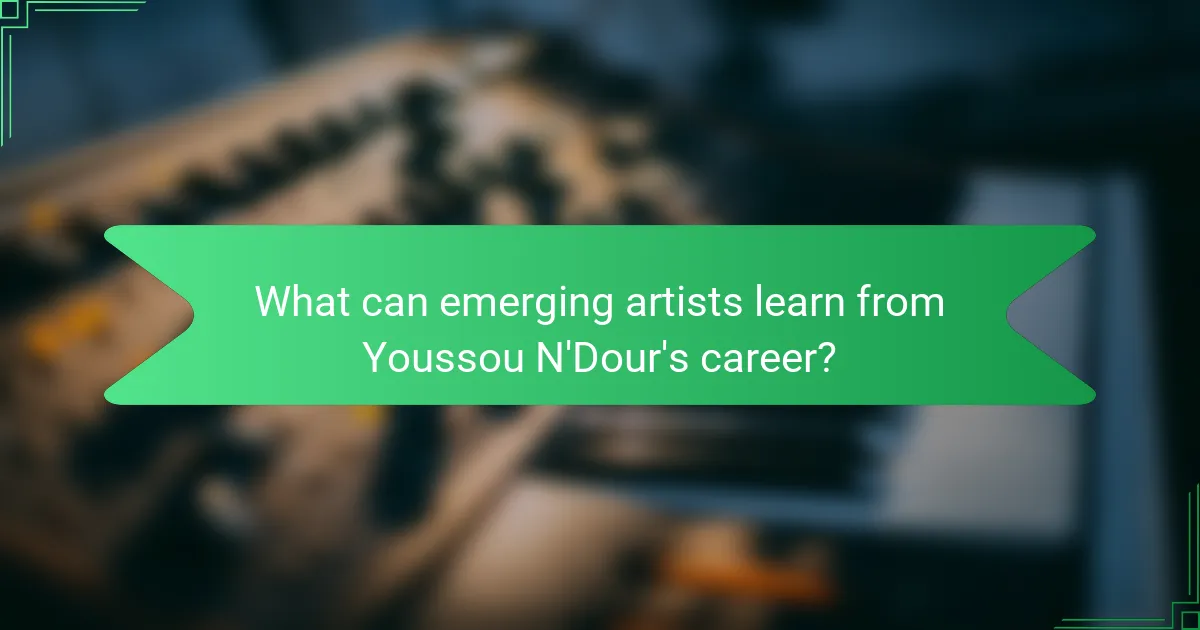
What can emerging artists learn from Youssou N’Dour’s career?
Emerging artists can learn the importance of genre blending, social activism, and building a lasting musical legacy from Youssou N’Dour’s career. N’Dour’s ability to fuse traditional Senegalese music with various genres, such as jazz and pop, showcases the value of innovation. His commitment to social issues through music illustrates how artists can use their platforms for activism, resonating with audiences on deeper levels. Additionally, his sustained success over decades highlights the significance of adaptability and maintaining artistic integrity in a changing industry.
What best practices can be derived from his approach to genre blending?
Youssou N’Dour’s approach to genre blending offers several best practices. First, embrace cultural diversity by integrating various musical styles, which enhances creativity and broadens appeal. Second, prioritize social messages within music, as this fosters a deeper connection with audiences. Third, collaborate with artists from different genres to create innovative sounds that challenge traditional boundaries. Lastly, maintain authenticity by staying true to personal roots while exploring new influences, which builds trust and loyalty among fans.
How can artists effectively engage in social activism through their work?
Artists can effectively engage in social activism by using their platforms to raise awareness and inspire change. Youssou N’Dour exemplifies this through genre-blending music that addresses social issues. His work combines traditional Senegalese sounds with global influences, making his messages accessible to diverse audiences.
N’Dour’s activism includes campaigns for human rights and education, directly impacting his community. He uses music as a tool for advocacy, mobilizing support for various causes. This approach highlights the unique attribute of his artistry: the ability to fuse entertainment with powerful social messages.
Moreover, N’Dour’s collaborations with other artists amplify his reach, showcasing the rare attribute of cross-cultural engagement in activism. By creating songs that resonate emotionally, he fosters a sense of unity and purpose among listeners.
In summary, artists like Youssou N’Dour demonstrate that blending genres and leveraging music can effectively drive social change, making activism a core component of their legacy.


